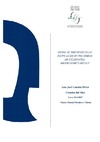Identificador persistente para citar o vincular este elemento:
https://accedacris.ulpgc.es/jspui/handle/10553/74454
| Campo DC | Valor | idioma |
|---|---|---|
| dc.contributor.advisor | Montero Vítores, Daniel | - |
| dc.contributor.author | Lencina Pérz, Ana José | - |
| dc.date.accessioned | 2020-09-16T13:57:59Z | - |
| dc.date.available | 2020-09-16T13:57:59Z | - |
| dc.date.issued | 2017 | en_US |
| dc.identifier.uri | https://accedacris.ulpgc.es/handle/10553/74454 | - |
| dc.description.abstract | The meagre (Argyrosomus regius, Asso, 1801) is a relatively recently introduced species in Mediterranean aquaculture. It is characterized by its fast growth, in addition to its high protein and low lipid content, it is therefore recommended as food because of its high nutritional value. To carry out the farming of this species it is necessary to know the most optimal nutritional requirements for the well-being of its development. Stress is an event that the majority of live organisms experiment, and generates a series of responses produced by the neuronal, endocrine and immune system. One of the concerns that fish nutrition confronts is the attempt to replace fish flour and fish oil (FO) with other alternative sources such as vegetable oil (VO), which in turn include the essential fatty acids (EFA), key in nutritional requirements. It is well-known that stress response is modulated by nutrition, so the general aim of this study is to see the effect that the substitution of fish flour and FO with VO has on the response to stressful conditions in aquaculture. In order to achieve this general objective, the following specific objectives have been formulated: a) To study the effect of different levels of dietary EFA on post-stress plasma cortisol levels, b) To study the effect of dietary EFA in the evolution of the relative expression of genes of the oxidative enzymes catalase (CAT) and glutathione peroxidase (GPX) in the liver after the action of a stressor. | en_US |
| dc.language | eng | en_US |
| dc.relation | Exploring The Biological And Sociio-Economic Potential Of New/Emerging Candidate Fish Species For The Expansion Of The European Aquaculture Industry | en_US |
| dc.subject | 251092 Acuicultura marina | en_US |
| dc.subject.other | Argyrosomus regius | en_US |
| dc.subject.other | CAT | en_US |
| dc.subject.other | Cortisol | en_US |
| dc.subject.other | EFA | en_US |
| dc.subject.other | Oxidative stress | en_US |
| dc.subject.other | GPX | en_US |
| dc.title | Study of the effects of fatty acids in the stress of cultivated Argyrosomus regius | en_US |
| dc.type | info:eu-repo/semantics/bachelorThesis | en_US |
| dc.type | BachelorThesis | en_US |
| dc.contributor.departamento | Departamento de Biología | en_US |
| dc.contributor.facultad | Facultad de Ciencias del Mar | en_US |
| dc.investigacion | Ciencias | en_US |
| dc.type2 | Trabajo final de grado | en_US |
| dc.utils.revision | Sí | en_US |
| dc.identifier.matricula | TFT-42343 | es |
| dc.identifier.ulpgc | Sí | en_US |
| dc.contributor.buulpgc | BU-BAS | en_US |
| dc.contributor.titulacion | Alumnos de intercambio | es |
| item.grantfulltext | restricted | - |
| item.fulltext | Con texto completo | - |
| crisitem.advisor.dept | GIR Grupo de Investigación en Acuicultura | - |
| crisitem.advisor.dept | IU de Investigación en Acuicultura Sostenible y Ecosistemas Marinos (IU-Ecoaqua) | - |
| crisitem.advisor.dept | Departamento de Biología | - |
| crisitem.project.principalinvestigator | Izquierdo López, María Soledad | - |
| Colección: | Trabajo final de grado Restringido ULPGC | |
Visitas
275
actualizado el 15-ene-2026
Descargas
55
actualizado el 15-ene-2026
Google ScholarTM
Verifica
Comparte
Exporta metadatos
Los elementos en ULPGC accedaCRIS están protegidos por derechos de autor con todos los derechos reservados, a menos que se indique lo contrario.
